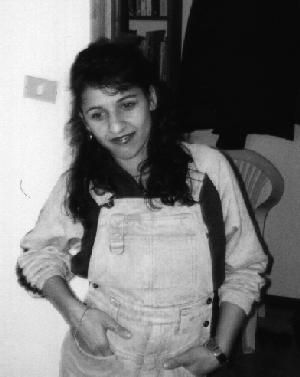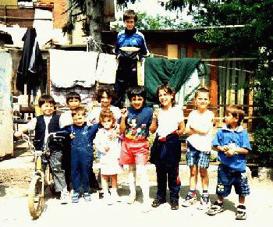"How much more
clearly everything appears from this uttermost edge of the world. Over
there, less than one mile away, the enormous steel tie-rods of the football
stadium, spotted with towers and pylons like a Medieval manner: every Sunday,
the same, unceasing routine of men, 'quoted' at 50, 60, sometimes 70 billion
lire [about 30 to 40 million US dollars] showing themselves off… Here,
in this bleak, barren, dead stretch of land, on this side of the immense,
cement-grey parking lots, warehouses and factories, is where men live,
whose monetary value is almost absolutely zero. Instead of paying to purchase
them, they pay to drive them away."
Marco Revelli, Fuori luogo: cronaca
da un campo rom, Bollati Boringhieri, Torino 1999
 The seagulls were crying
their names
The seagulls were crying
their names
This is a story you almost certainly
never heard - how could you? Nobody ever told you.
There is a boy from the land alone on the
sea, alone between the salt of the deep and the August sun. He is a Rom
on a piece of wood. Days and nights go by. The fishermen find him. He is
the only one alive. They were one hundred and five, and only one is still
left.
One hundred and four bodies slowly swimming
in front of Montenegro. One hundred and four softened, sweetened bodies,
eroded by water… there is even a scientific word for this, saponification.
Murat works in a factory in Bergamo, in the
north of Italy. He goes to the usurers, who grow fat on suffering even
among the Rom, and gets into debt to pay his nephew's way out of Kosovo.
The boy comes to Italy alive. But on the
sunken ship there were thirteen relatives of his mother. Thirteen relatives.
Memories, laughter, affection, jealousy, burning hatred, jokes, all saponified,
caressed by the nibbling fish.
Murat went to Montenegro to recognise the
white pebbles of flesh, where all that could be recognised were the names
tattooed on the arms according to ancient custom - the strange names of
the Rom, never the same.
"Bombing slot"
I had met Bajram and Reska (her full name
is actually Rezijana) Berisha in Verona in 1992. Not an unusual scene:
a "Gypsy" girl, as they say, from Kosovo, on a wheelchair, silently accepting
- rather than asking - alms. Next to her, sometimes, her father. Easy to
put a bad meaning upon the scene: at the end of the day, one could imagine
the little girl folding up her wheelchair, walking away and handing her
money over to her father so he could spend it on drink.

Reska
However, I did not meet them where
they asked for alms. I met them on a bleak stretch of the banks of the
Adige, the post-industrial outskirts. She was truly on a wheelchair, struck
by polio at the age of three. He did odd jobs, and it was only when he
was not working that he went to keep his daughter company. And of course
he did not spend the money on drinking.
For seven years, I heard nothing more about
them: I only knew they had moved to Brescia. Then the Kosovo war broke
out. Two wars in one: all the tragic reality of which the Balkans are capable
on the one hand, on the other hand, a global show. I would have listened
to the real people, but how could I listen when the NATO spokesmen were
saying that the Serbs had made a little Auschwitz in the mines of Trepça,
where it appears no bodies were ever found? I missed the pictures of the
refugees taken to Italy on navy ships, or of the shiny killing machines
of the US Airforce.
During the war, I went to the airport to
pick up a businessman who had come from Germany, and who apologised for
being late. His delay was due to the "bombing slot", the hours set apart
for air raids. For example, killings from 9 to 11, businessmen - patiently
waiting with their briefcases, after 11 o'clock.
It was only afterwards, when they pulled
the curtain down and told us that the show was over - the good side, of
course, having won - that I started to pay attention. Tiny news items,
here and there, spoke of an entire people being uprooted. Just as Clinton's
soldiers played their victorious entry into Prishtina, the Rom were being
driven out of a country where they had lived for centuries. Thousands were
trying to cross the Adriatic under terrible conditions, while Italian Premier
Massimo D'Alema reassured all the good people, "we shall send every one
of them back home." Some good souls who were giving donations to help refugees
wrote on their packages, "for Albanians only, do not give to Gypsies."
You are welcome to use this article on condition that you put the whole
text of "Collateral Lives" on your website and provide a link to http://www.kelebekler.com/
e-mail
Home | Il curatore del sito | Oriente, occidente, scontro di civiltà | Le "sette" e i think tank della destra in Italia |
La cacciata dei Rom o "zingari" dal Kosovo | Il Prodotto Oriana Fallaci | Antologia sui neoconservatori | Testi di Costanzo Preve | Motore di ricerca | Kelebek il blog
|
